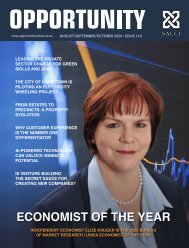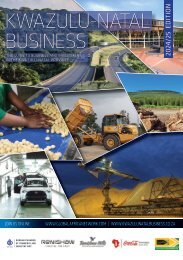Gauteng Business 2016 edition
The 2016 edition of the Gauteng Business and Investment Guide is the premier business and investment guide for the Gauteng province and the Gauteng Growth and Development Agency (GGDA). In addition to detailed profiles of key provincial organisations, including the GGDA, the Automotive Industry Development Corporation Centre (AIDC), the Gauteng Investment Centre, the Gauteng IDZ, the Gauteng ICT Park SEZ and Constitution Hill, this edition includes well-researched economic and demographic data on the province, as well as insights into the province’s five development corridors and the new industries and development nodes in these corridors; a focus on Gauteng as a global city region; and key growth sectors for the province.
The 2016 edition of the Gauteng Business and Investment Guide is the premier business and investment guide for the Gauteng province and the Gauteng Growth and Development Agency (GGDA). In addition to detailed profiles of key provincial organisations, including the GGDA, the Automotive Industry Development Corporation Centre (AIDC), the Gauteng Investment Centre, the Gauteng IDZ, the Gauteng ICT Park SEZ and Constitution Hill, this edition includes well-researched economic and demographic data on the province, as well as insights into the province’s five development corridors and the new industries and development nodes in these corridors; a focus on Gauteng as a global city region; and key growth sectors for the province.
You also want an ePaper? Increase the reach of your titles
YUMPU automatically turns print PDFs into web optimized ePapers that Google loves.
SPECIAL FEATURE<br />
tablished corporate footprints, a<br />
culture of innovation, easy access<br />
to finance for business, a stable<br />
macro- and micro-financial climate,<br />
an advanced banking system<br />
and functioning regulatory<br />
frameworks, of which most either<br />
reside in the province, or are governed<br />
from there.<br />
Opening more doors of opportunity<br />
is the fact that <strong>Gauteng</strong><br />
is the leading economy in the<br />
country and SADC region, and<br />
a key player in Africa’s business<br />
landscape, contributing 11% to<br />
Africa’s economy.<br />
Yet, no matter how one looks<br />
at it, the facts underscore the<br />
strategic significance of <strong>Gauteng</strong>,<br />
the fourth biggest economy in<br />
the continent, in strengthening<br />
economic trade and partnerships<br />
with African and BRIC countries.<br />
In the BRICS context, <strong>Gauteng</strong><br />
is viewed as the ‘Gateway to<br />
Africa’ – an attractive place for<br />
investments on the continent<br />
– for a number of reasons. The<br />
province offers:<br />
• Easy access to African markets.<br />
• Functional national institutions<br />
protecting the right of<br />
investors.<br />
• Clear and consistent economic<br />
policies in line with national<br />
policies.<br />
• Good infrastructure and facilities;<br />
high-quality road, rail and<br />
air networks.<br />
• An investor-friendly environ<br />
ment.<br />
• A large pool of young, highly<br />
skilled labourers, whose<br />
skill sets match the needs<br />
of modern manufacturing,<br />
finance, and engineering<br />
industries.<br />
• A large pool of skilled labour for the manufacturing, trade and<br />
transport sectors.<br />
• Low land and commercial building costs.<br />
• Believe it or not, <strong>Gauteng</strong>’s electricity is among the cheapest in<br />
the world.<br />
The recent global economic crisis, which started in the United States,<br />
had a huge impact on the world economy. It especially impacted<br />
the economic recovery expectations of developed countries. As the<br />
countries with the most active economic growth in the world, BRICS<br />
countries face a great challenge. They need to adjust their development<br />
strategies when facing the new challenge in order to achieve<br />
rapid and sustainable economic development.<br />
Economy<br />
<strong>Gauteng</strong> outflanks other provinces in a number of key economic<br />
metrics. It has continuously outperformed South Africa’s other eight<br />
provinces when measured in terms of their respective provincial contributions<br />
to national GDP and in comparisons of provincial real annual<br />
economic growth rates. In 2015, <strong>Gauteng</strong> contributed 36% to national<br />
GDP (up from 34.5% in 2011)—well above the second and third largest<br />
contributions from KwaZulu-Natal (16%) and the Western Cape (17%)<br />
respectively.<br />
The contributions of the remaining six provinces to national GDP<br />
were all below 10%. Furthermore, average growth rates in <strong>Gauteng</strong><br />
have comfortably exceeded the national average in the past decade—<br />
the province’s annual average growth rate between 2001 and 2011 was<br />
4.6%, above the national average of 4%.<br />
In addition, the province boasts a comparatively wealthy consumer<br />
base, with a population that has, on average, both the highest earners<br />
and biggest consumers on the continent. According to the 2011 Census,<br />
annual average household incomes in <strong>Gauteng</strong> (R156 243) far exceed<br />
the national average of R38 734.<br />
All of the above contributes to the fact that <strong>Gauteng</strong> is South<br />
Africa’s strongest economic performer, and a very favourable partner<br />
to both contribute to the BRICS relationship, and benefit form it as well.<br />
However, one cannot lose sight of the fact that the global financial crisis<br />
had a major impact on the world economy and the economic recovery<br />
prospects of the BRICS countries as well. Neither South Africa, nor the<br />
<strong>Gauteng</strong> province was immune to this blow. Leading economists have<br />
warned that BRICS, as a group of developing countries (with the most<br />
active economic growth in the world), will have to adjust their development<br />
strategies in order to achieve rapid and sustainable economic<br />
development in this new climate.<br />
In this regard, developing its economic hubs with the introduction<br />
of five new business corridors was a brilliant strategy by the <strong>Gauteng</strong><br />
75 GAUTENG BUSINESS <strong>2016</strong>


















